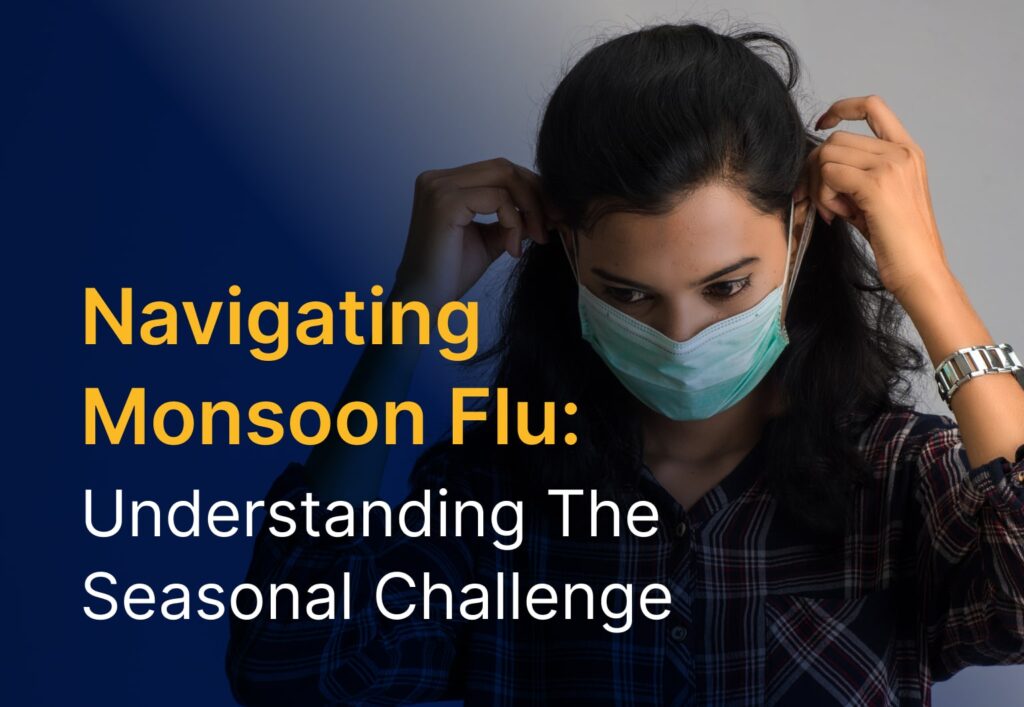- January 4, 2024
- By: admin
- No Comments
Navigating Monsoon Flu: Understanding the Seasonal Challenge
With the monsoon in full swing, we find relief from the scorching heat but also find ours amid a host of health challenges, with the rise of monsoon flu being a notable concern. In this comprehensive blog, we will delve into the reasons behind the increased prevalence of flu during the monsoon, the importance of taking precautions, symptoms to watch out for, different types of flu and diseases that spread during the season, preventive measures, coping strategies if caught, and when it’s crucial to seek medical care.
Understanding the Seasonal Challenge: Why Does Flu Spread During the Monsoon?
The monsoon season creates an environment conducive to the spread of flu viruses. The combination of increased humidity, stagnant water, and fluctuating temperatures provides an ideal breeding ground for viruses. Moreover, the monsoon often brings people in close proximity, facilitating the easy transmission of the flu from one person to another.or a refreshing twist.
Increased Humidity:
High humidity levels can help flu viruses survive in the air for a more extended period, increasing the chances of transmission.
Stagnant Water:
Puddles and stagnant water become breeding grounds for mosquitoes, leading to the spread of diseases like dengue and contributing to the overall health challenge during the monsoon.
Fluctuating Temperatures:
The temperature variations during the monsoon can weaken the immune system, making individuals more susceptible to infections.
Symptoms of Monsoon Flu: Recognizing the Warning Signs:
Understanding the symptoms of monsoon flu is crucial for early detection and timely intervention. Common symptoms include:
Fever and Chills:
A sudden rise in body temperature accompanied by chills is a common indicator of flu.
Cough and Sneezing:
Persistent coughing and frequent sneezing are typical respiratory symptoms of flu.
Body Aches and Fatigue:
Generalized body aches and fatigue are common flu symptoms that can significantly impact daily activities.
Sore Throat:
A scratchy or painful throat is another symptom often associated with flu.
Headache:
Intense headaches are common during flu infections and can contribute to overall discomfort.
How to Prevent Monsoon Flu and Related Diseases:
Preventing monsoon flu involves adopting a holistic approach to health and hygiene. Here are effective preventive measures:
Personal Hygiene:
Regular handwashing, maintaining personal hygiene, and using hand sanitizers can help prevent the spread of flu viruses.
Vector Control:
Eliminating stagnant water around homes and using mosquito nets or repellents can prevent diseases like dengue and malaria.
Vaccination:
Consider getting vaccinated against influenza to reduce the risk of contracting seasonal flu.
Balanced Diet:
A diet rich in vitamins and minerals supports a healthy immune system, enhancing the body’s ability to fight off infections.
Stay Hydrated:
Drinking plenty of water helps flush out toxins and supports overall well-being.
Dealing with Monsoon Flu: Coping Strategies if Caught:
If you find yourself caught in the grip of monsoon flu, here are some strategies to help cope with the symptoms:
Rest:
Allow your body ample time to rest and recover, helping it fight off the infection more effectively.
Stay Hydrated:
Hydration is crucial for recovery. Drink plenty of fluids, including water, herbal teas, and soups.
Over-the-Counter Medications:
Over-the-counter medications can help alleviate symptoms such as fever, headaches, and body aches.
Warm Saltwater Gargle:
A warm saltwater gargle can provide relief for a sore throat.
When to Seek Medical Care:
While many cases of monsoon flu can be managed at home, certain situations warrant immediate medical attention:
High and Persistent Fever:
A high and persistent fever that does not subside with over-the-counter medications requires medical evaluation.
Difficulty Breathing:
If you experience difficulty breathing or chest pain, seek medical attention promptly.
Severe Dehydration:
Signs of severe dehydration, such as dizziness, rapid heartbeat, or reduced urine output, require urgent medical care.
Persistent Vomiting:
Persistent vomiting can lead to dehydration and may necessitate medical intervention.
Worsening Symptoms:
If symptoms worsen or persist for an extended period, consult a healthcare professional for a thorough evaluation.
SMF: A Holistic Approach to Healthcare:
As we brace ourselves for the challenges of monsoon flu, it’s imperative to remember that expert guidance and comprehensive healthcare support can make all the difference. Sundaram Medical Foundation (SMF) stands as a beacon of health and well-being, offering specialized care to navigate seasonal challenges effectively.
At SMF, every patient receives personalized care, with treatment plans tailored to address their unique health needs, ensuring a comprehensive and effective approach to recovery. Adopting a holistic approach, SMF considers not only the symptoms but also the overall well-being of patients, emphasizing the importance of preventive care and long-term health strategies.
Your health matters and SMF is here to ensure you receive the best care possible. Take the first step towards a healthier you – visit Sundaram Medical Foundation today!
